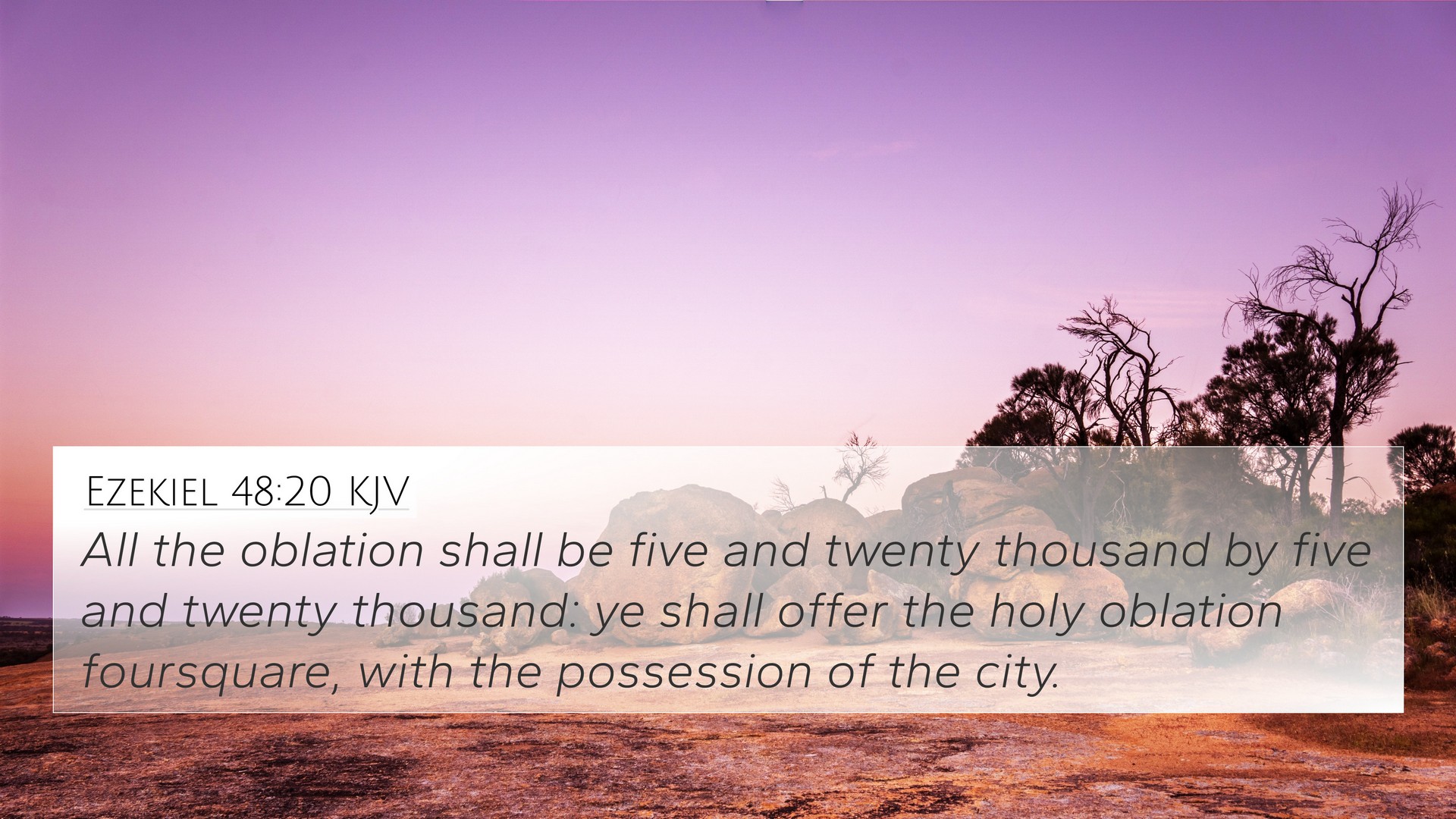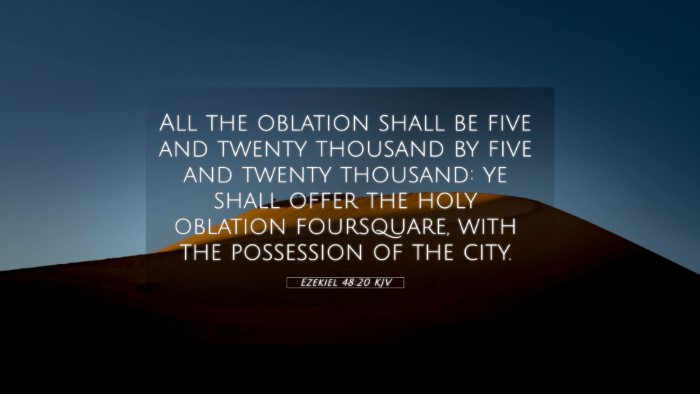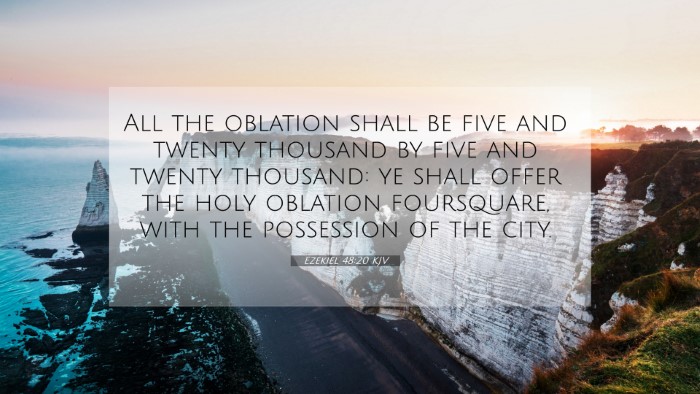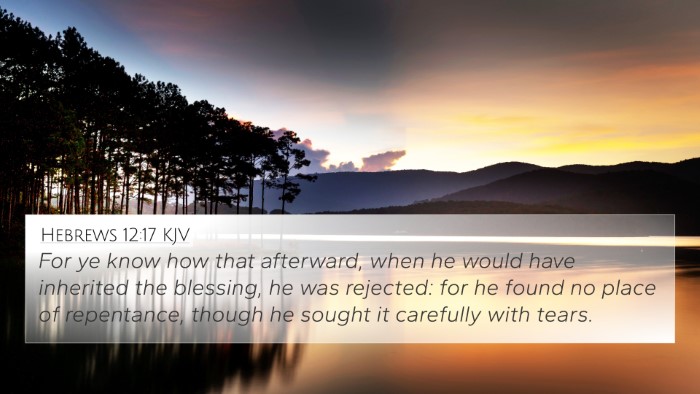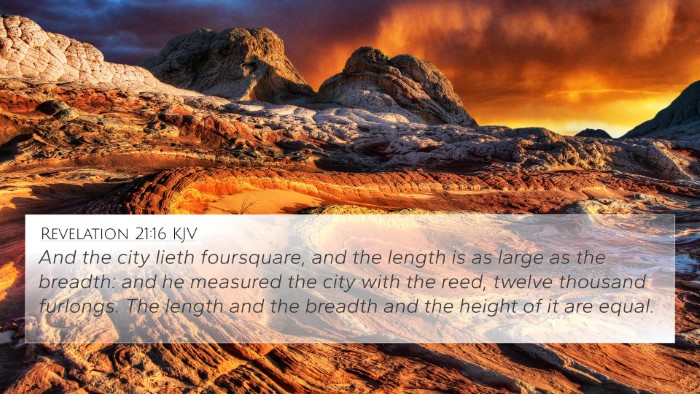Ezekiel 48:20 - Summary and Interpretation
Bible Verse: Ezekiel 48:20
Verse Text: "All the oblation shall be five and twenty thousand by five and twenty thousand: ye shall offer the holy oblation foursquare, with the possession of the city."
Understanding Ezekiel 48:20
The verse Ezekiel 48:20 is part of a prophetic vision given to Ezekiel that outlines the division of the land of Israel among the twelve tribes and the allocation of the sanctuary area. It emphasizes the centrality and holiness of the land set apart for God’s purposes.
Significance of the Holy Oblation
The term "holy oblation" in this context refers to a sacred gift or offering made to God. This land was not merely a geographical territory but was imbued with spiritual significance, underscoring God’s presence among His people.
Commentary Insights
Matthew Henry: Matthew Henry emphasizes the organization of the land and its offerings. He notes that God’s order in the division of the land signifies His purpose and sovereignty over the people’s lives and their faithfulness to Him.
Albert Barnes: Albert Barnes provides insight into the measurements, showing how precision in God’s instructions reveals His desire for holiness among His people. He highlights that the square designation represents completeness and unity in worship and offerings.
Adam Clarke: Adam Clarke discusses the implications of the measurements and the concept of holiness regarding how the community relates to God and to each other. He points out the importance of offering to God from a position of unity within the community.
Cross-References and Thematic Connections
This verse connects with various other scriptures, illustrating the thematic biblical connections concerning land, offerings, and God’s holiness:
- Numbers 34:1-2: The boundaries of the Promised Land are established, emphasizing the significance of land ownership in God’s covenant.
- Isaiah 54:3: Highlights expansion and blessing, akin to the themes in Ezekiel regarding the land and God’s promises.
- Deuteronomy 12:5-7: Discussing the selection of a place for God’s name to dwell reflects the importance of holy space.
- Revelation 21:2: The connection is drawn between the earthly Jerusalem and the New Jerusalem in eschatological vision, linking holiness across time.
- Psalm 47:4: This Psalm speaks of the land God has chosen for His people, reiterating His sovereignty over all territory.
- Jeremiah 32:41: Reflects on God’s joy and delight in His people, which echoes the sentiments of holiness expressed in Ezekiel.
- Matthew 5:5: Jesus refers to the meek inheriting the earth, connecting to the inheritances outlined in the Old Testament.
Historical Context and Application
The chapter itself is set during a time of significant transition for the Israelites as they returned from Babylonian exile. The specificity of the land divisions is meant to reassure the people of God’s continued covenants and ensure that the land is recognized as holy. In application, the contemporary reader is reminded that the land and offerings symbolize one’s relationship with God and the importance of dedicating resources for His glory.
Tools for Bible Cross-Referencing
For those seeking deeper understanding, utilizing a Bible concordance or a Bible cross-reference guide can provide insight into the broader connections between passages. Cross-reference Bible study enhances comprehension of themes that recur throughout Scripture, facilitating a more profound theological reflection.
Conclusion
The miraculous and detailed assembly of the land allocations in Ezekiel 48:20 serves as a reminder of God's meticulous planning and holiness. The themes of unity, sacred offerings, and divine ownership resonate throughout the Bible, fostering an understanding of inter-Biblical dialogue that connects the Old Testament with New Testament revelations of God's character and community.
